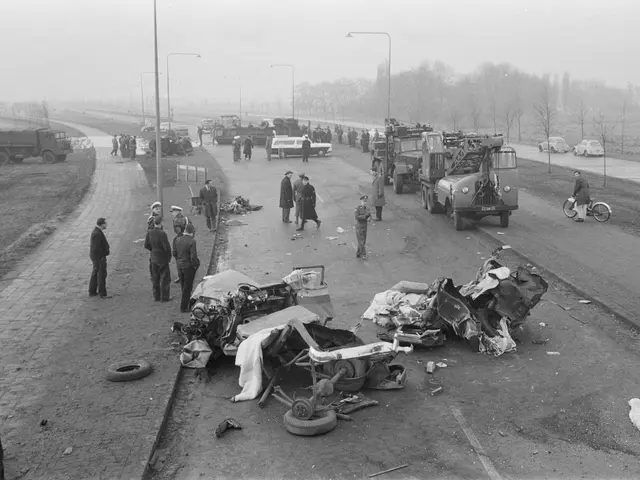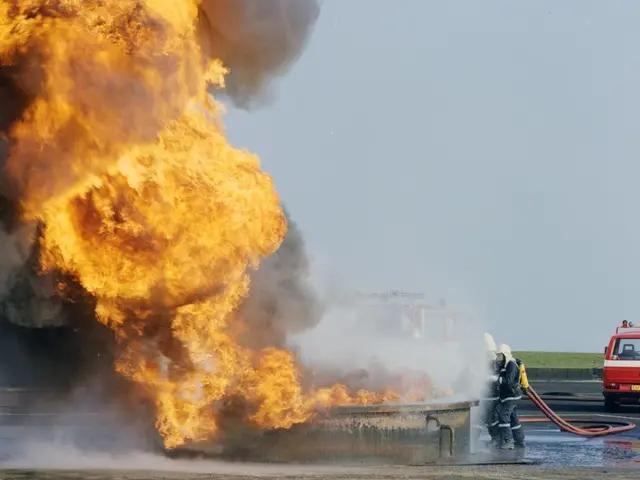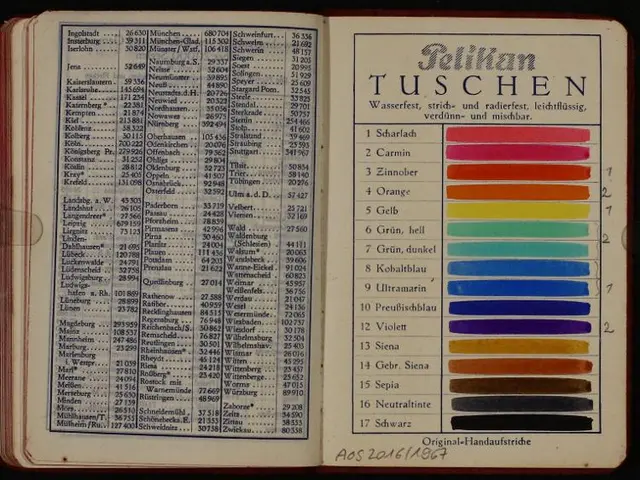Israel attacks Iran's Defense Ministry headquarters; Tehran retaliates with lethal missile barrage.
Tensions soar between Israel and Iran as missiles fly
Waking up to the sound of air raid sirens and booms on June 15, 2025, residents in Jerusalem and Tel Aviv experienced a stark reminder of the escalating conflict between Israel and Iran. For the third consecutive day, the two nations exchanged fire, a dramatic increase from the initial skirmishes last Friday.
As of June 16, the death toll surpassed 230 across both countries, with Israeli strikes causing damage to Iranian military, government, and energy facilities. Meanwhile, Iranian missiles targeted Haifa and Tel Aviv, penetrating Israel's air defense system and causing casualties.
Incendiary Attacks
The conflict has resulted in devastating damage across both countries. Iran has reported 224 deaths and 1,277 injuries, with Israeli attacks hitting Iranian military and government facilities, including the Defence Ministry, missile launch sites, and air defense component factories. Israeli attacks have also damaged numerous government buildings and energy facilities in Iran, notably the Shahran oil depot north of Tehran and a fuel tank south of the city.
Israel, on the other hand, has suffered 14 civilian deaths and 390 injuries, primarily from Iranian missile strikes on Haifa and Tel Aviv. In a particularly devastating incident, a ballistic missile strike on a building in Bat Yam, just south of Tel Aviv, resulted in four civilians dead and 100 injured.
Interception and Defense
Iran's missile campaign has been relentless, launching multiple waves of ballistic missiles and drones at Israel. The IDF reports at least 270 missiles have been launched since Friday. Since June 14, Iran conducted two main waves of ballistic missile attacks (totaling 80 missiles according to the IDF) targeting Haifa and Tel Aviv, as well as "dozens" of drones. The Israeli Air Force successfully intercepted at least 10 Iranian drones but failed to stop some ballistic missiles, like the one that hit Bat Yam.
Collateral Damage and Economic Impact
The conflict's effects are far-reaching, with Haifa's oil refinery and port area sustaining damage from Iranian strikes. fires were reported, and emergency responders struggled to control them. Israel's main international airport and airspace remained closed for a third day due to the hostilities.
In Iran, the conflict has raised concerns about a broader assault on its heavily sanctioned energy sector, which is crucial for global markets. Strikes on several Iranian government and energy facilities are raising worries.
International Complications
US-Iran nuclear talks were canceled on Sunday, further complicating the international response to the crisis. This ongoing violence shows no immediate signs of abating, with both countries threatening further escalation and continuing to target each other's critical infrastructure and leadership.
The situation remains highly volatile, with significant loss of life and infrastructure damage on both sides, and a continuing risk of further escalation.
- The escalating conflict between Israel and Iran has led to international discussions on diplomacy and potential interventions in war-and-conflicts, with global leaders expressing concerns about the general-news and political instability in the region.
- As the missile exchange continues, the tension has spilled over to international television, with numerous news stations extensively covering the fallout of the war-and-conflicts and its impact on travel, particularly for those planning journeys to the Middle East.
- Amidst the turbulent international climate, crime-and-justice systems worldwide have also braced themselves for potential repercussions, as experts warn of the potential for war-related crimes and the possible ensuing legal complexities.
- The defense industry stands to gain significantly from the ongoing war-and-conflicts, as Israel and Iran develop and upgrade their military capabilities, while other nations are offered the opportunity to showcase their own technologies in the international market.
- As the consequences of the conflict span across various sectors, including international relations, general-news media, and even the energy industry, the international community grapples with finding a resolution that reduces the intensifying tension between Israel and Iran, and curtails the devastating effects of war-and-conflicts on both nations.








